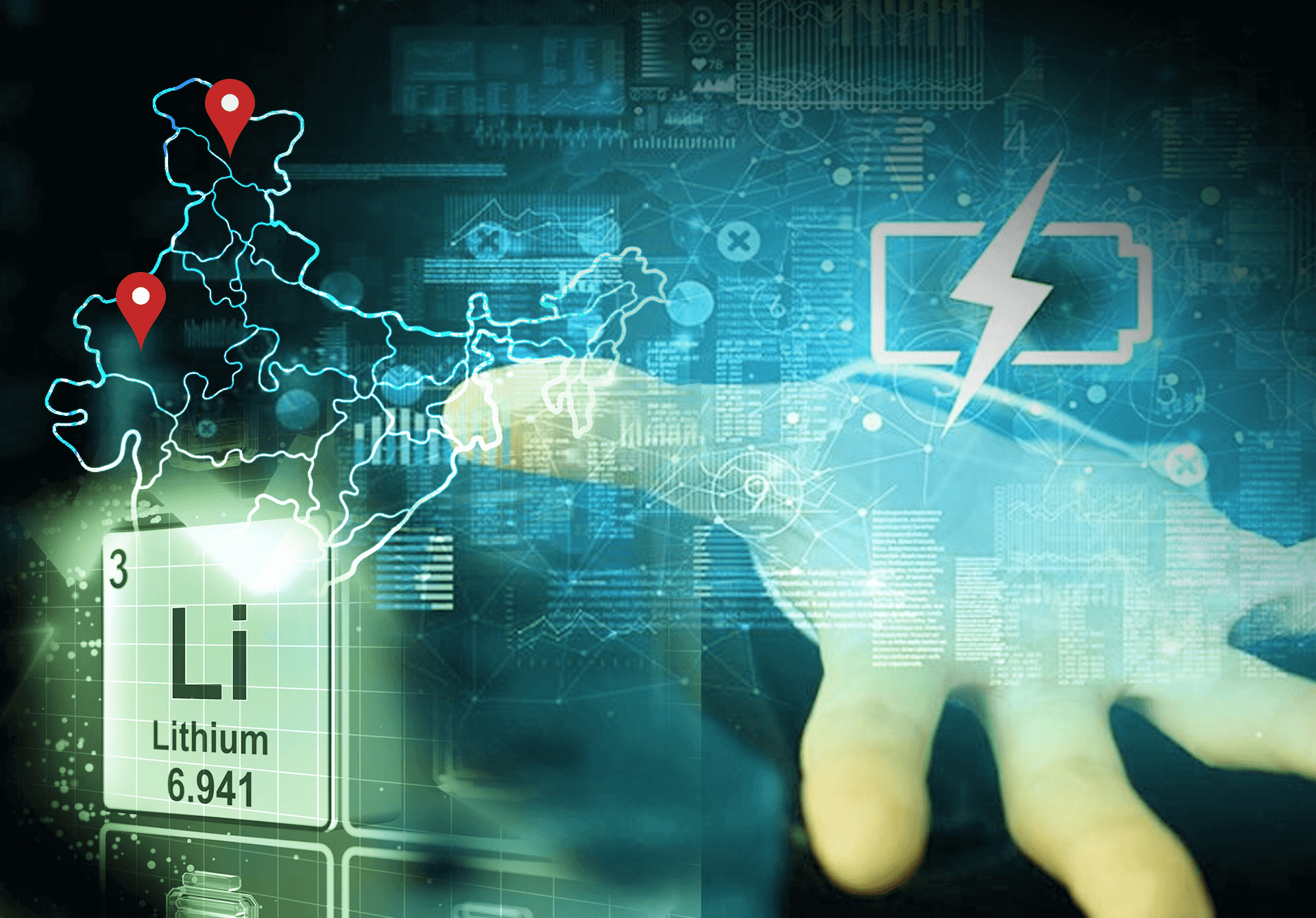Introduction:
Lithium-ion batteries have emerged as the cornerstone of modern technology, powering various devices such as smartphones, laptops, and electric vehicles (EVs). As the demand for clean energy solutions grows, the availability of lithium resources has become crucial. This blog explores the significant discoveries of lithium resources in Rajasthan and Jammu & Kashmir, their potential impact on India’s energy security, the government’s initiatives for exploration and production, the prospects and challenges, and the economic and environmental implications of utilizing these resources.
Overview of Lithium-Ion:
Lithium-ion (Li-ion) batteries are rechargeable power sources that rely on the movement of lithium ions between electrodes. They offer high energy density, longer lifespan, and lighter weight compared to other battery technologies. Li-ion batteries have revolutionized the portable electronics industry and are now playing a pivotal role in the transition to electric mobility and renewable energy storage.
At present, the global Lithium deposits are concentrated in South America’s lithium triangle– Argentina, Bolivia & Chile, at 50%. Whereas when it comes to Lithium refining, China leads the race, by controlling 75% of the market share.
Detailed Information about Lithium Resources in Rajasthan, Jammu & Kashmir:
Rajasthan and Jammu & Kashmir have recently witnessed significant discoveries of lithium resources, positioning India as a potential player in the global lithium market.
In Rajasthan, lithium deposits have been found in the Sambhar Salt Lake and the surrounding areas. The lake is estimated to hold substantial lithium reserves, making it one of the largest known lithium resources in the country. The lithium-rich brines present in the lake offer the potential for cost-effective extraction methods.
As far as Jammu & Kashmir is concerned, the Union Government announced that for the first time in the country, 5.9 million tonnes of lithium reserves have been discovered in Jammu and Kashmir.
In Jammu & Kashmir, the region of Ladakh is known to contain lithium-bearing pegmatites. Pegmatites are coarse-grained igneous rocks that often host minerals with high lithium content. The identification of these lithium-rich pegmatites presents an opportunity for the development of mining operations in the region.
Why is this development crucial?
It is crucial because India plans to increase its EV penetration by a whopping 30% by 2030, which relies heavily on lithium! Compare that to the present scenario, where barely 1% of all vehicle sales in the country can be attributed to EVs.
What’s more, the quantity of lithium found in Rajasthan is estimated to meet around 80% of India’s demand! Great news for EV and environmental enthusiasts everywhere!
Exploration and Production Initiatives by the Government:
Recognizing the strategic importance of lithium resources, the Indian government has undertaken various initiatives to promote exploration and production in Rajasthan and Jammu & Kashmir.
The government has initiated partnerships between public and private sectors to accelerate the exploration of lithium resources. It has also launched geological surveys and studies to assess the quantity and quality of the lithium deposits. These efforts aim to create a robust database of lithium resources, which will be crucial for future planning and development.
Future Prospects and Challenges:
The discoveries of lithium resources in Rajasthan and Jammu & Kashmir hold immense promise for India’s energy security and the growth of the EV industry. These resources can help reduce the country’s dependence on lithium imports and strengthen the domestic supply chain.
However, several challenges need to be addressed to fully harness the potential of these resources. Developing efficient extraction and processing technologies, ensuring environmental sustainability, and establishing a skilled workforce are among the key challenges that need to be overcome. Additionally, the availability of infrastructure for mining operations and the establishment of refining facilities will be critical for the successful utilization of these resources.
Economic and Environmental Impacts:
The development of lithium resources in Rajasthan and Jammu & Kashmir can have significant economic and environmental impacts. On the economic front, the establishment of mining operations and lithium processing facilities can create job opportunities, attract investments, and contribute to regional development. Moreover, a self-sufficient lithium supply chain can reduce the cost of lithium-ion batteries, making EVs and renewable energy storage more affordable for consumers.
From an environmental standpoint, the adoption of EVs powered by domestically sourced lithium can contribute to reducing carbon emissions and improving air quality. It aligns with India’s commitment to combating climate change and transitioning to a sustainable and low-carbon future.
Conclusion:
The discoveries of lithium resources in Rajasthan and Jammu & Kashmir have the potential to transform India’s energy landscape and enhance its energy security. The government’s initiatives for exploration and production are critical in unlocking the full potential of these resources. As India aims to accelerate the adoption of EVs and renewable energy, developing a robust and sustainable lithium supply chain becomes imperative. By effectively harnessing these lithium resources, India can strengthen its position in the global clean energy revolution while addressing economic and environmental challenges.





